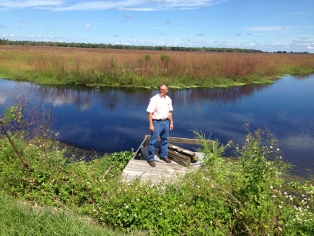|
One Way to Save Florida Waterways: Turn Water into a Cash Crop  November 13, 2013 | WMFE - Alarm for Florida's polluted waterways is reaching Tallahassee and Washington. House Minority Leader Nancy Pelosi declared the problem during a congressional hearing one of "national significance." Among the solutions proposed: Partner with ranchers and citrus growers to cleanse and store water. Proponents call it farming water. They say it's proven successful and is ready for expansion. But the money isn't there. [Photo: Jimmy Wohl says more ranchers and citrus growers will want to farm water as they hear about it working successfully on ranches like his.] At the Rafter T Ranch in Sebring cows cluster lazily in the shade of palm trees, while a 150-acre retention pond is a scene reminescent of the days before Florida was drained. It's a marshy paradise for wildlife attracting roseate spoonbills and freshwater pelicans. Jimmy Wohl says he's never seen birds like that before on his ranch. "The cypress trees in that pond, if you come back here this evening it'll be white with the white ibis that roost in there." Wohl has spent nearly all of his life here. It's the same 5,200-acre ranch his father bought in 1962. He got into farming water about five years ago after three hurricanes soaked Lake Okeechobee, forcing the lake's polluted water to coastal estuaries. He's let ditches fill with sediment to create the 150-acre retention pond. He's also planted water-tolerant grasses where cows can graze during the winter dry season. He's undoing much of his father's work to drain the land. "When my dad bought the property he immediately built a dike along the creek so that he could protect his property from excess water, keep it pumped out and maximize his ability to grow forages. And that was the mindset in those days." Wohl is one of nearly two-dozen Florida ranchers and citrus growers who are farming water. Two dozen more are lined up for funding. But it's not there. For nearly a decade the South Florida Water Management District has paid landowners north of Lake Okeechobee to cleanse and store water. The idea is to turn water into a cash crop. Landowners are paid by the amount they store. The price also is based on the value of the cattle or crop they otherwise would raise on the land. Charles Lee of Audubon of Florida says farming water is the latest in an evolution of water management in this state of frequent rain and hurricanes. "There are literally tens of thousands of miles of canals and ditches that have been built in the Kissimmee watershed beginning back in the early 20th century, many of them with no permits, no engineering, no water control structures." Floridians drained much of the Kissimmee watershed and nearly all of South Florida for housing and agriculture. But soon they discovered draining too much left them vulnerable to drought during the winter dry season. In recent years attention has turned toward storing water. Lee says letting ranchers and citrus growers do that works better economically than building large expensive reservoirs. "You're keeping the ranches in business. You're storing the water. You're actually helping wildlife rather than smothering wildlife." Storing water north of Lake Okeechobee relieves pressure on the lake's dike. It was built more than a half-century ago to hold back flooding but today is in poor condition. Heavy rain this summer forced the U.S. Army Corps of Engineers to release water from the lake into coastal estuaries, filling them with pollution and turning them toxic. Florida Agriculture Commissioner Adam Putnam says the state can help. "Every gallon of water we can hold back from entering the lake means you're going to have much less pressure on the fragile dike system and that much less opportunity for the corps to release it and cause harm to our coastal communities." Putnam says dysfunction in Congress makes funding to repair the dike unlikely anytime soon. That's why he wants to direct state resources toward the northern Everglades. A Senate select committee has recommended an additional $3 million for farming water projects. That's good news to Jimmy Wohl. He applied for funding earlier this year but was turned down. He wants to expand his farming water project using the dike his father built. "The ironic thing is he built it to keep water out of the ranch, and now we're using it to keep water in the ranch." The Legislature is expected to consider more funding for farming water projects during its spring session. |
|